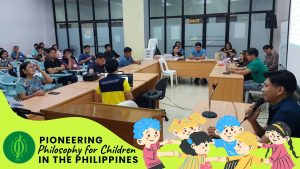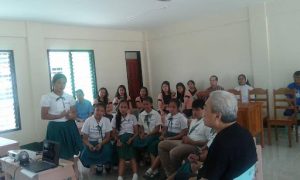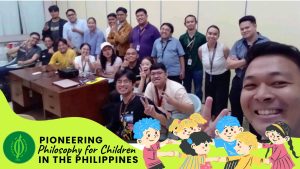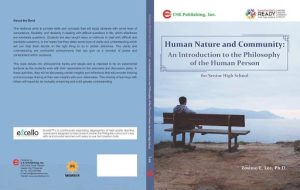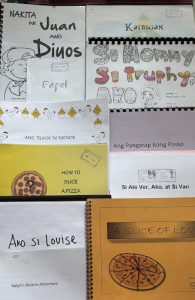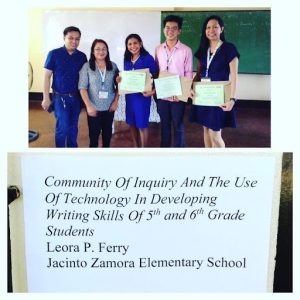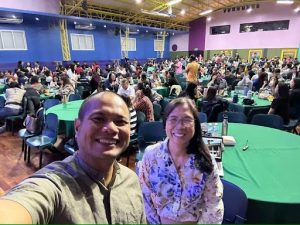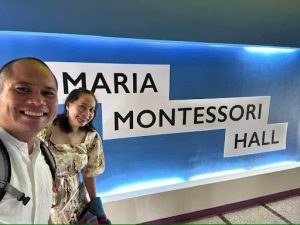
Figure 1: Training workshop at Leyte Normal University.
Philosophy for Children is an educational movement which started in the late 1960s when Matthew Lipman was still in Columbia. It focuses on the idea of the classroom as a community of inquiry (COI). In the 70s, Lipman met Ann Margaret Sharp in Montclair State University and together they developed university-level programs in P4C.
Back in 1990, while Prof. Zosimo Lee was finishing his PhD in the State University of New York at Buffalo (Suny Buffalo), he chanced upon a leaflet on Philosophy for Children (P4C), which came from the Institute for the Advancement of Philosophy for Children (IAPC) at Montclair State University, New Jersey.
“On hindsight, it seems that my work in Philo for Children was really in consonance with what I already started in my doctoral dissertation involving rational conflict resolution and somehow the work with Philosophy for Children became in sync,” Lee narrates.
Dr. Lee is referring to how his research centered on themes involving the notions of “rational conflict resolution, peace building, being able to deal with different perspectives, and the role of philosophy in providing that kind of understanding which Rawls calls public reason.” He even wrote an article on the creation of public reason wherein he compared Rawls’ perspective with Habermas’ perspective and linked it with the role of the community of inquiry by Matthew Lipman.
Having met both Matthew Lipman and Ann Margaret Sharp who were the pioneers of P4C and Community of Inquiry (COI) in a conference in 1996 helped Dr. Lee appreciate even more the importance of a dialogical community. After the conference, Lipman published Dr. Lee’s article on communicative inquiry in the journal, Thinking.
After said conference, Dr. Lee incorporated what he learned in his own classes, and it led to projects wherein he taught P4C as a pedagogical tool to public elementary school teachers. Philosophy colleagues, Asst. Prof. Renato Manaloto, Dr. Napoleon Mabaquiao, Atty. Darlene Berberabe-Lim, Atty. Eric Vera, Asst. Prof. Isidro Manuel Valero, as well as the late Dr. Silvino Epistola and Dr. Leonardo De Castro joined him.
Dr. Lee used the method of communicative inquiry to grade school students and the learning agenda came from students. He diligently made the rounds in different districts in the public schools of Manila between the years of 1997-1999. These weekly sessions truly helped public school teachers who now had a new pedagogical tool to use. Because of this experience, Dr. Lee was able to see how to implement a training program using the methodology of the COI. Most importantly, how to use this innovative tool within the Department of Education curriculum.

Figure 2: Session in Leyte with grade school students
Building a Community of Inquiry
Dr. Lee fondly remembers one instance.
“In P. Gomez (school), I facilitated a Grade 6 class. The discussion came to the question, ‘What is the difference between the mind and the brain?’ The students were so good at furnishing ideas and giving examples. They were so articulate that I felt that the students were already getting ahead of the teacher and the teacher was the one who was trying to catch up. But that just shows that when the students feel talk about their own ideas and share their own thoughts, they really become free… They own their own learning.”
In 2000, Dr. Lee returned to the IAPC in Mendham, New Jersey. He says, “It further deepened what I learned from the first seminar and reinforced some of the hypothesis in the training programs that I was conducting.” He then became a long-standing member of the screening committee for the writing awards of the International Council of Philosophical Inquiry with Children. He also presented a paper in a council meeting of practitioners of P4C from all over the world in Winchester, England. He was at the UNESCO meeting in Paris when UNESCO adopted P4C as an educational practice.
He continued to teach P4C in his undergraduate and graduate courses even as he juggled it with his leadership role as Dean of the College of Social Sciences and Philosophy in UP Diliman. In 2012, he continued his work in training public school teachers and principals in and around Manila, especially in Tondo, who were introduced to the community of inquiry. The Center for Excellence in Public Education (CENTEX) in Tondo, Manila, and Bauan Batangas adopted the COI in their teaching and these trained teachers were also the ones that provided the facilitation during the training programs in Negros and Cagayan de Oro with the help of Ayala Foundation. This worthwhile endeavor was further expanded to provinces outside Manila.
Dr. Lee clarifies, “What does the COI do? Because you shift the generation of the learning agenda from the teacher to the students, the students take more initiative in their own learning process. And it starts with asking questions. Kasi isa sa mga nawawala sa mga bata eventually, if it is not encouraged, is the asking of questions. Children when they were very young ask a lot of questions. And the questions of children at 2-3 years are the most profound philosophical questions you could ever find.”
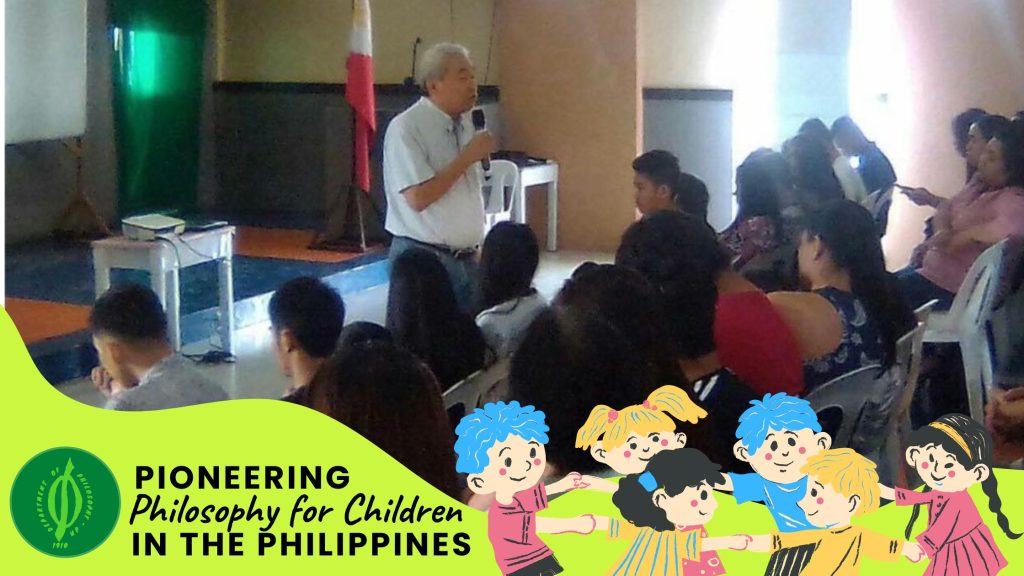
Figure 3: Giving a talk to parents In Urdaneta, Pangasinan about P4C
He further adds that one of the most important things to do during these workshops is to rekindle the teachers’ curiosity as well to arouse their questioning ability and their own sense of wonder. With his experience and knowledge, Dr. Lee has developed his own format and has even incorporated the Filipino perspective in his method, making the tool even more effective in the context of Philippine education. He emphasizes that
“… the whole point of the community of inquiry is really to focus on the thinking process. Because it is through and in the thinking process, the learning occurs. The students learn to think for themselves, to value their own thinking. They get to generate their own criteria to when they can say to themselves that they are thinking better. And this is done together with others so that the learning process is collective, and it is shared. There is also self-correction.” Both students and teachers share this experience of “building criteria for better reasoning”.
Dr. Lee considers the culmination of his lifelong work in a 2016 project done with UNESCO at Ateneo de Manila University, wherein participants from other countries such as South Korea and Myanmar joined. Grade 6 students, Filipino children who benefitted from previous workshops, impressively demonstrated the community of inquiry to the participants by conducting their own philosophical discussions. One professor from Myanmar even said that they want their children to be able to do what they witnessed.
P4C in the Philippines Now
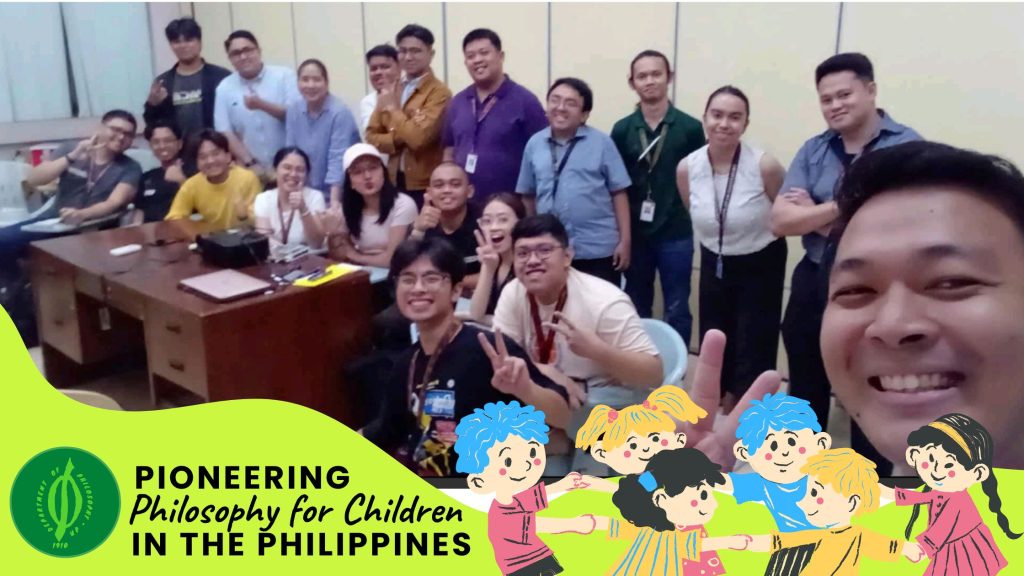
Figure 4: Second Semester AY 2024-2025 Philo 298 (Philosophy for/with Children) graduate students under Dr. Ma. Theresa Payongayong pose with undergraduate students after a P4C session on 19 May 2025.
Dr. Lee’s P4C legacy endures even after his retirement from academic life. Not only has it reverberated in the public school system who directly learned from him, his colleagues from the Department of Philosophy in UP Diliman continues to train teachers and students to further propagate P4C and the community of inquiry. Dr. Ma. Theresa Payongayong attributes to Dr. Lee her introduction to P4C. She shares,
“While I have been involved in various P4C trainings, seminars, workshops and other P4C-related activities over the past 25 years, I hold Dr. Zosimo E. Lee in high regard as the pioneer in P4C. I appreciate his invitation for me to participate in P4C mainstreaming efforts among public and private basic education teachers. My interest in P4C was sparked by the realization that it has the potential to catalyze meaningful change and improve the education system.”
Dr. Payongayong considers her initiative to offer P4C classes at both the undergraduate and graduate levels a pioneering effort. As part of this, she provided students with the opportunity to engage in actual P4C sessions with grade school and high school students from both public and private schools. Some of her students participated in sessions in Bulacan, Batangas, Marikina, Manila, and even at our own UPIS. In 2005, she also learned directly from Matthew Lipman and Ann Margaret Sharp through the IAPC Training Workshop. She was the only Filipino participant at that time.
A group of faculty members from the department led by Dr. Jeanette Yasol-Naval conducted a teachers’ training for the subject, Introduction to the Philosophy of the Human Person and P4C sessions were held as a culminating activity. In partnership with DepEd Division of Nueva Ecija from 25-27 July 2018 and 19-21 June 2019, over a hundred teachers were introduced to the pedagogy. The group consisted of Dr. Payongayong, Dr. KC Abalos-Orendain, Asst. Profs. Symel de Guzman, Arlyn Macapinlac, and Romulo Bañares.

Figure 5: Above are UP instructor Gavin Chuacuco and OB Montessori coordinator Ms. Sarah Adap and another OB Montessori teacher.
Dr. Lumberto Mendoza also continues Dr. Lee’s legacy. He conducted a face-to-face training workshop on the use of Community of Inquiry for teaching in OB Montessori School, San Juan. He has given similar workshops online as well. This was in 2020 with Minadanao State University in General Santos City. He worked with junior faculty members such as Mr. Gavin Nigel Chuacuco, Ms. Aleli M Caraan, and Asst. Professor Marielle Antoinette Hermoso Zosa, ensuring that these techniques will be passed on to the next generation of facilitators.
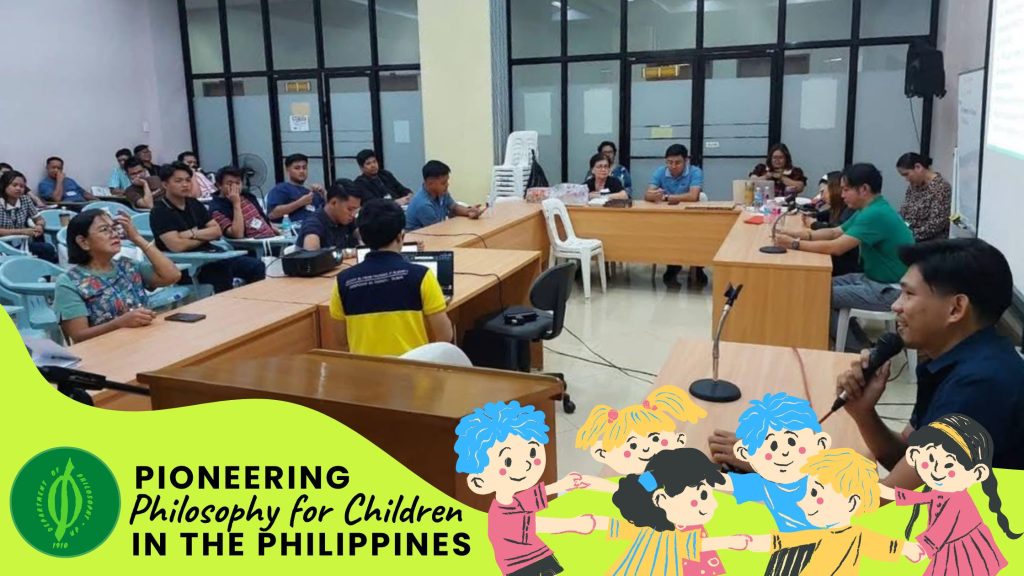
Figure 6: CSSP Extramural Training “Reclaiming the Self: The Role of Philosophy in Navigating Challenges in Research”
Most recently, COI was used by Inst. Gavin Chuacuco, Inst. Patrick Joshua Villegas, Asst. Prof. Symel Noelin de Guzman-Daulat, Asst. Prof. Macapinlac, Dr. Lily Beth Centeno-Lumagbas, and Dr. Ma. Theresa Payongayong in the CSSP Extramural Training Seminar for Social Science Teachers with the theme, “Ethics, Artificial Intelligence, and Knowledge Production.” The department led the workshop entitled “Reclaiming the Self: The Role of Philosophy in Navigating Challenges in Research” was a mix of lectures and a community of inquiry.
Indeed, the Department of Philosophy in UP Diliman continues to propagate and develop P4C, especially in light of the inclusion of the course, Introduction to the Philosophy of the Human Person in the Kto12 Program of the Department of Education. Because of this commitment, six of the senior faculty members of the leading analytic philosophy school in the country will participate in the 2025 Summer Program of the Institute for the Advancement of Philosophy for Children (IAPC) in Montclair State University in New Jersey. Dr. Payongayong, who is currently the Assistant Vice President for Academic Affairs (Curriculum and Instruction) for the UP System will attend the IAPC course once again and she will be joined by Department Chair, Dr. Liza Ocampo as well as Dr. KC Abalos-Orendain, Dr. Lily Beth Centeno-Lumagbas, Asst. Prof. Arlyn Macapinlac, and Dr. Jeanette Yasol-Naval. Through these efforts, the department endeavors to establish a P4C Center soon.
Written by Dr. Karen Connie Abalos-Orendain
Photos and Captions by Dr. Zosimo Lee, Dr. Ma. Theresa Payongayong, Dr. Lumberto Mendoza, and Asst. Prof. Arlyn Macapinlac
Check out more photos of P4C activities facilitated by faculty and students of the UPD Department of Philosophy.

